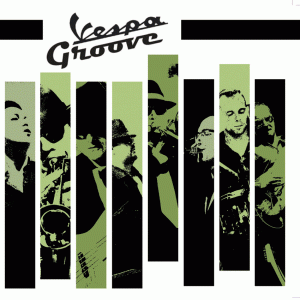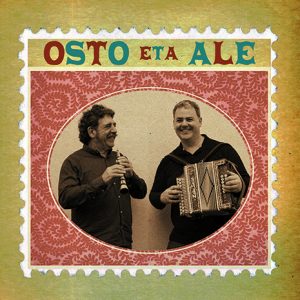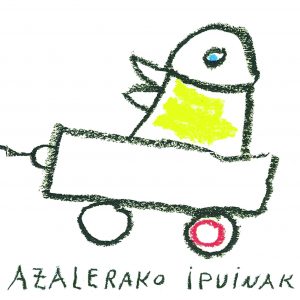
Ehungarrenean hamaika
10.00 €
Words
1. Gari : Bertso zarrak
2. **Eñaut Elorrieta** : Mendigoixaliarena
3. Mikel Urdangarin : Loretan
4. Rafa Rueda : Kanta ariña
5. Jabier Muguruza : Zelayetakua
6. Txuma Murugarren : Arrotzak
7. Francis Diez : Jardetsi-Eziña
8. Xabier Montoia : Liparra
9. Anje Duhalde : Otsokorena
10.Xabi Strubell : Neskatxu gorrixka bati
11.Petti : Amayur gaztelu baltza
-
BERTSO ZARRAK
Gari
Ancient Verses
What little is necessary in this life.
Happiness fits in a glass of wine,
In song and in the enjoyment of love.
To sing, to pour, to drink,
Lying down like lovers.
To laugh, to steal furtive kisses,
Leaving that the afternoon falls.
The world abounds in splendors
Nothing compared to that which holds
in your dark, womanly body.
-
MENDIGOXALIARENA
Eñaut (Ken Zappi)
Of Mendigoxale
Dedicated to Kepa Basaldua
(Mendigoxale literally means mountaineer. In reality, the title makes reference to the Basque Nationalist Organization, Mendigoxaliak, to which Lauaxeta belonged.)
Ten youth agilely walk along the still damp mountainside, the Basque flag flaps in the open wind (which is how the author wants it). Accompanied by their walking sticks, they sing: You must give it everything, for liberty, so beloved, you must give it everything! Later, silence falls over the land of Basque Country.
In the landscape there lies a forest in flames; far away shines a sea of silver. The shout of the youth, painful, is the shout of a village that reclaims with nerve (EL HITZA KENKU DUT) the dawn of liberty: You must give it everything, for liberty, so beloved, you must give it everything! Later, silence falls over the land of Basque Country.
The youth follow the mountain upward, singing and waving their flags. Suddenly, in the fog, various shots sound. The grass tints to red. The doves flee frightened. Ten youth, at life?s peak, lie dead. In the peace of dusk someone continues to sing: You must give it everything, for liberty, so beloved, you must it give everything! Later, silence falls of the land of Basque Country.
-
LORETAN
Mikel Urdangarin
In Bloom
Masterly utilizing the stylized manner of the Basque tongue?s resources, the author returns to the theme of the lover who courts at night. Below the window of his beloved, he sings his love?s pain. Most noteworthy, in this poem Lauaxeta reaches one of the climax moments of his work, referred to as the musicality and the expressiveness of the Basque language.
-
KANTA ARIÑA
Rafa Rueda
The Light Song
This poem, as a whole, enters into the theme of Carpe Diem. The author asks that the drink wet the lips. Anxious about beauty, he wants to be drunk forever. Even though he sees that his body is still in the bloom of youth, all that surrounds him seems to move fast. So, better, he says, to throw one?s self on the grass and drink: Drink youth! Do not let your lips dry out, although that which they desire is the kiss of other lips. Drink!, yells the poet, whose years quickly roll by. If we must lose our youth, may it be at the bottom of a mug.
-
ZELAYETAKUA
Jabier Muguruza
In the Country
With cadence and extraordinary musicality, this composition by Lauaxeta entertains the theme of a young girl who in outward appearances goes to the country to pick flowers. However, in reality she goes in search of her lover, whom has invited her to laugh and enjoy in his love. The ambient is purely that of the countryside, with Basque flutes and drums (those which the poet requests be sounded slowly) to grass blown by the wind and robins singing from their tree branch.
-
AROTZAK
Txuma Murugarren
The Two Carpenters
In this composition, Lauaxeta presents the theme of two carpenters, one young and one old, who work in unison. The first builds a bed and the second a coffin. The poet observes them while they strive at their work and speaks with each one. He requests the young man to finish the bed quickly, in order to be able to enjoy it with his lover. To the old man he asks that he take his time in finishing the coffin. In the end, fatal destiny alters the order of these events
-
JADETSI-EZIÑA
Francis Diez
Unobtainable Desire
This composition is a metric exercise in which the musicality of the Basque language used by the poet stands out. It moves between desire for his beloved?s lips, for her kisses (which are like rose petals at the height of Spring), and the impossibility of acceding them. The poet moves about like a butterfly, caressing flowers, but refusing to kiss that which he desires most.
-
LIPARRA
Xabier Montoia
The Moment
The author returns to the motif of Carpe Diem. The shadow of white clouds rolls over the countryside, with death?s breath closely sensed. The only thing left to ask for are caresses and kisses, to enjoy the moment of the rose, and to forget about tomorrow, in which nobody knows if the lovers will continue to desire each other. To live for the moment, even without worrying about saving it as a memory.
-
OTSOKORENA
Anje Duhalde
The Wolf Cub?s Romance
The wolf wants to cross the river in order to devour the sheep that graze on the other shore. It tries to do so by boat, without paying the fee in exchange for telling three truths to the boatman. These truths are no more than obvious facts. The first, being that Spring is better than Winter. The second, that the barrel does not pursue the drunk. And the third, that once the wolf has already crossed to the other shore, without paying any more toll than these three truths, the boatman will never become rich in allowing his passengers to do such.
-
NESKATXU GORRISKA BATI
Xabi Strubell
A Small, Blond Girl
Like the title indicates, the poet sings to a young, blond girl who leaves to go to the countryside and has not yet returned. The poet recreates the landscape, in addition to the light and the color of the scenery. He looks for the contrast that makes what has been lost by the object of his affection stand out, in a composition with an absolute naïf air.
-
AMAYUR GAZTELU BALTZA
Petti(And that Maya Castle
that the duke had for me)
Amaiur, Black Castle
Lauaxeta uses the invasion of Upper Navarra by Ferdinand of Arragon?s troops as the motif of this poem, with Amaiur Castle in the year of 1521 as the backdrop.
The poem is divided into three parts; wherein the first part the poet recreates the moment in which 200 loyal knights defend Amaiur Castle in the last stand of the Kingdom of Navarra?s independence. Suddenly, the horizon fills with foreign invaders.
In the second part, the author recounts the siege of the castle by the Count of Miranda, who is accompanied by the traitor (this is how the poet names him), the Count of Lerín (whom the narrator wishes to be devoured by dogs). The battle continues. Defended by 200 warriors, the castle appears impregnable.
However, the towers finally fall, and at the foot of the castle wall lie 200 cadavers. In Navarra, says the poet, the Motherland is no longer, wishing to express the loss of Navarra?s independence. In the context in which the poem was written, during the Second Republic, there came into being a sense of lament due to the fact that the representatives of Upper Navarra?s municipalities (in a decision still debated today, wherein some voted yes in order to retain power and some changed their vote of their own volition) did not support the Statute of Autonomy, thereby being susceptible to lose the four historic, peninsular, Basque territories.




